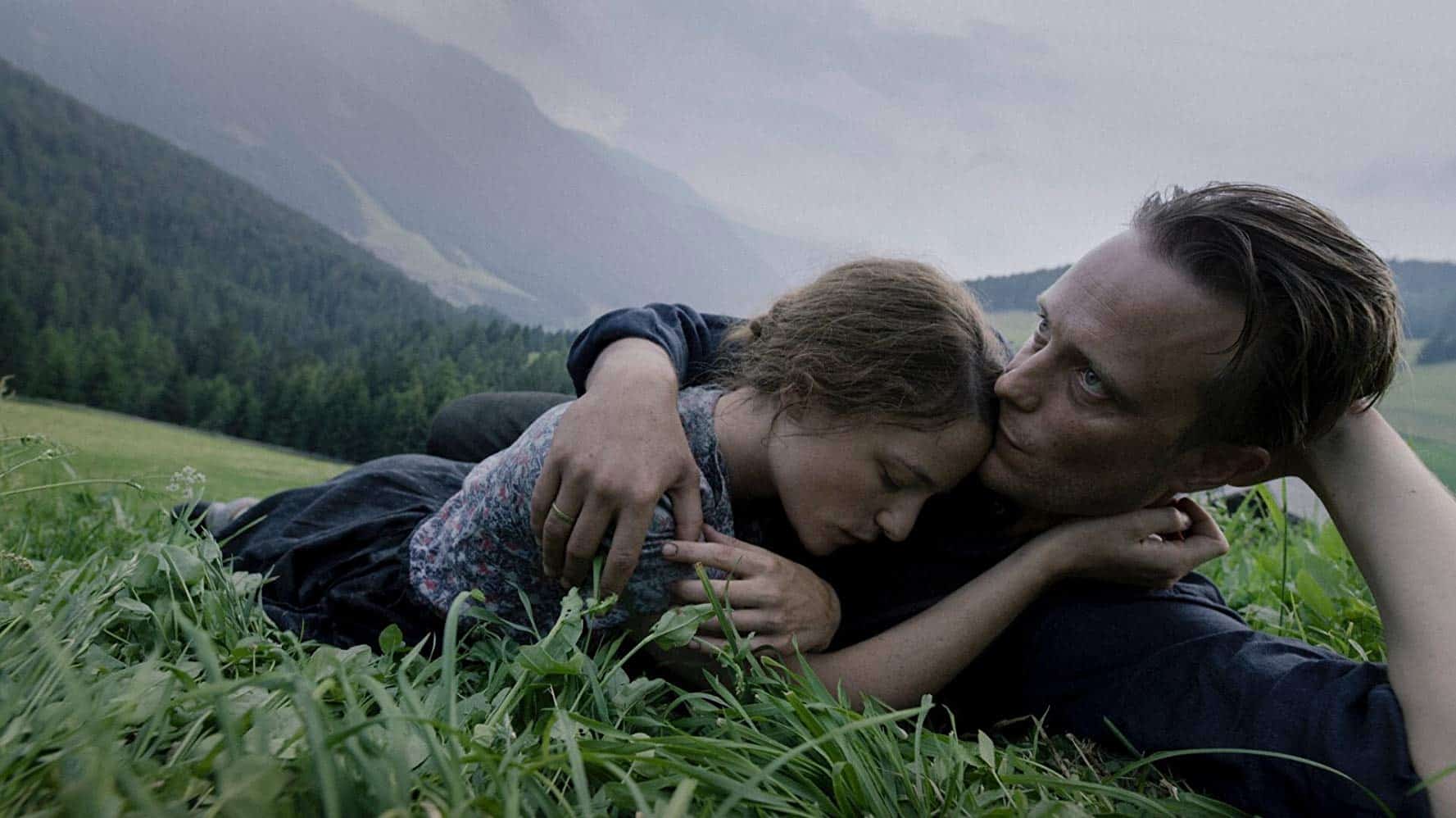Warning: this review contains spoilers
“For you died, and your life is now hidden with Christ in God. When Christ, who is your life, appears, then you also will appear with him in glory.” (Colossians 3:3-4)
Last Saturday two friends, a married couple, and I watched Terrence Malick’s A Hidden Life. The movie recounted the life of Franz Jägerstätter (1907-1943), an Austrian farmer who refused to serve in the Nazi military because he believed that fighting for Hitler would violate his Christian commitment to not kill. Malick painstakingly depicts the prelude to Franz’s decision and the consequences that flow from it.
Set amidst a beautiful Alpine backdrop, we see Franz’s loving relationship with his wife Franzsiska, three young daughters, and aged mother. His days are quite ordinary-billing hay, building barns, and milking cows. Yet, we also see him grapple with the decision to sign the oath of allegiance to Hitler. And, after he decides to refrain from doing so, we witness the Nazis imprisoning him and eventually killing him. Franz’s village ostracizes his family and we realize that the social cost of his decision. At the end of the film, my female friend turned to her husband and whispered, “If you were in that position, I want you to know that you should sign the oath!”
I was very struck by her comment and upon asking, she clarified that Franz’s actions seemed completely absurd given his commitments to his family. I couldn’t help but agree that there is something profoundly uncomfortable about Franz’s situation. Malick clearly depicts him as a hero, but I began to wonder, what kind of hero is he? Pope Benedict XVI beatified Franz in 2007. In Catholic lingo, this means that the Church recognized that Franz practiced “heroic virtue” and “lived in fidelity to God’s grace.”1 It seems that while Blessed Franz was undoubtedly courageous, the real question is not one of heroism but rather sanctity. What can Blessed Franz teach us about sanctity, in his time and in ours?
Malick’s film provides one possible answer in a scene where Franz helps his friend, Ohlendorff to repair their parish church. After Franz compliments Ohlendroff on his painting of Christ, he responds:
“Others will look at this picture, and think that sympathizing with him, being moved by his story, will benefit them in the beyond. They’ll count themselves lucky that they didn’t live in times like ours, when your life might be demanded of you. Instead of suffering for the truth, I paint it. I turn the suffering of the brave into my livelihood…I paint this comfortable man. A halo over his head. Some day I’ll paint the true one.”
Yet, the paradox of this conversation is that true icon of Christ comes not from the hand of Ohlendroff but from the life of Franz. His opposition to signing the oath stemmed from a deep conviction cooperating with the Nazis would be nothing other than a betrayal of the God who became human, suffered, died, and rose for Him in the person of Jesus Christ. Within the matrix of his life circumstances, the pigments of Franz’ prayer and opposition swirled together to show an icon, not of a comfortable man, but of a true Christ who understood that truth makes demands of us.
And yet, my friend’s comment remains. There is a level of irrationality to Franz’s actions. Saints challenge us. They disrupt the easy habits that we slip into. Far too easily, we can simply opt for what is most convenient at the expense of what we owe to others out of justice. If Franz’s life seems absurd, it is a commentary that mirrors the even larger absurdity of Nazi Germany systematically murdering six million Jews along with many others. Moreover, he stands in clear contrast to the complicit masses who allowed such evil to go on.
In our own day, we are all too aware of the structural evils at work in the world. In addition to our own personal sins, we know of climate change, global wars, poverty, rising number of refugees, racism, the sex abuse crisis, and more. Franz found inspiration in his faith to bear the ultimate witness. His prayer and commitments allowed him to be a prophetic light in a Church that was sometimes too complicit with the forces of darkness.
The same Spirit that guided Jesus and that guided Franz is with each of us today. Franz invites us to trust that if we bring open and generous hearts to God in prayer that perhaps we too can bear witness to the power of a life that can withstand death. The poet Gerard Manley Hopkins once described Christ as playing in “ten thousand places, lovely in limbs and lovely in eyes not his”. Christ’s mystery played out in Blessed Franz’ life and by faith we believe that it will play out in ours.
—
Image courtesy of IMDb, used under Fair Use Laws
- See CCC 828 ↩


